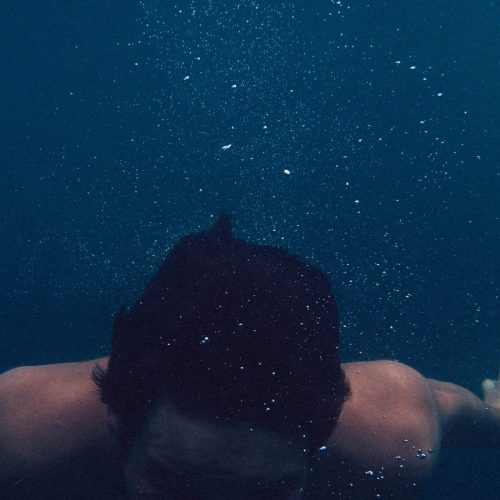Drowning in a Sea of Information

Try to remember the last time your phone was not the first thing you reached for in the morning. I can’t recall a time when it wasn’t.
Every morning my alarm goes off at 6:30 am. Before I lug my sluggish body from under the security of my warm sheets, I reach for my phone, pull it up inches away from my face, and start scrolling through whatever I missed overnight. This is not only the beginning of my morning routine, but also a routine behavior throughout the rest of my day — obsessively checking, collecting, and consuming content until I close my eyes and try to disconnect my brain for the night. This behavior is called Infomania, which is defined as “the compulsive desire to check or accumulate news and information, typically via cell phone or computer.”
Infomanics like myself are likely to feel the effects of information overload, a phenomenon caused by overdosing on information, which reportedly developed as early as the 3rd century BC, when writing allowed us to record and preserve information longer than memory. Information overload is a mentally, and physically, taxing condition. Symptoms include sluggish thinking, a flitting mind, and stifled creativity.
Read the rest of this article at Digital Culturist
China’s Memory Manipulators

When I first went to China in 1984, my fellow foreign classmates and I at Peking University used to play a game with an old guidebook. Called Nagel’s Encyclopaedia Guide: China, it was first published in 1968 in Switzerland and featured descriptions of important cultural sites visited by French diplomats and scholars. The key for us was that they had gathered the information in the 1950s and the early 1960s. In other words, this was just before Mao unleashed the Cultural Revolution, which destroyed tens of thousands of places of worship and historic sites across China. We would look a place up in Beijing and set off on our bikes to see what was left.
I remember one trip to find the Five Pagoda Temple, which was built in the late 15th century and featured five small pagodas on top of a massive stone platform. Nagel’s said most had been destroyed in the turmoil of the late 19th and early 20th centuries, but that the five pagodas were still there. Our 1980s maps of Beijing showed nothing, but Nagel’s intrigued us. Did it still exist?
We rode down Baishiqiao Street and tried to superimpose Nagel’s maps of old “Pékin” on our maps of an exhausted, post-Cultural Revolution Beijing. Eventually we had to stop and ask. After many fruitless efforts, we were led through the gates of a factory and into the temple, which was hidden in the back. All that was left was the large stone platform, topped by five stone pagodas. Tiles had fallen off the roof, and slabs of stone bearing inscriptions and decoration lay smashed on the ground. Weeds grew everywhere. Still, we walked the grounds with a sense of wonder: here was something that had vanished from today’s maps, and yet it existed. In one structure we had the story of China’s cultural grandeur, foreign invasions, auto-cultural destruction, but also of survival. Here, thanks to our odd guidebook, we had Chinese history in a nutshell – the past and the present.
Observing China sometimes requires a lens like Nagel’s. Walking the streets of China’s cities, driving its country roads, and visiting its centres of attraction can be disorienting. On the one hand, we know this is a country where a rich civilisation existed for millennia, yet we are overwhelmed by a sense of rootlessness. China’s cities do not look old. In many cities there exist cultural sites and tiny pockets of antiquity amid oceans of concrete. When we do meet the past in the form of an ancient temple or narrow alleyway, a bit of investigation shows much of it to have been recreated. If you go back to the Five Pagoda Temple today, you will find a completely renovated temple, not a brick or tile out of place. The factory has been torn down and replaced by a park, a wall, and a ticket booth. We might be on the site of something old, but the historical substance is so diluted that it feels as if it has disappeared.
What does this tell us about a country? Optimists feel a sense of dynamism – here, at last, is a country getting on with things while the rest of the world stagnates or plods forward. This is always said with amazement and awe. The apex of this era of wonder came shortly before the 2008 Olympics, when the western media tripped over itself trying to trot out the most effusive praise for China’s rise/transformation/rejuvenation – pick your cliche. Typical was a New York Times architectural critic, who raved upon arrival in Beijing in 2008 about “the inescapable feeling that you’re passing through a portal to another world, one whose fierce embrace of change has left western nations in the dust” and concluded that “one wonders if the west will ever catch up”.
Read the rest of this article at The Guardian
It’s 2020, four years from now. The campaign is under way to succeed the president, who is retiring after a single wretched term. Voters are angrier than ever—at politicians, at compromisers, at the establishment. Congress and the White House seem incapable of working together on anything, even when their interests align. With lawmaking at a standstill, the president’s use of executive orders and regulatory discretion has reached a level that Congress views as dictatorial—not that Congress can do anything about it, except file lawsuits that the divided Supreme Court, its three vacancies unfilled, has been unable to resolve.
On Capitol Hill, Speaker Paul Ryan resigned after proving unable to pass a budget, or much else. The House burned through two more speakers and one “acting” speaker, a job invented following four speakerless months. The Senate, meanwhile, is tied in knots by wannabe presidents and aspiring talk-show hosts, who use the chamber as a social-media platform to build their brands by obstructing—well, everything. The Defense Department is among hundreds of agencies that have not been reauthorized, the government has shut down three times, and, yes, it finally happened: The United States briefly defaulted on the national debt, precipitating a market collapse and an economic downturn. No one wanted that outcome, but no one was able to prevent it.
Read the rest of this article at The Atlantic
Europhobia: a Very British Problem

I could not consent to the introduction into our national life of a device so alien to all
our traditions as the referendum,” Clement Attlee said, “which has only too often
been the instrument of Nazism and fascism.” In the spring of 1945 Winston Churchill
was still prime minister, leading the wartime coalition, and Attlee, the Labour leader,
was his deputy. A general election was overdue, after the parliament, elected 10
years earlier, had artificially prolonged its own life. Now Churchill suggested
prolonging it still further, and putting this proposal to the electorate in a then-unheard-of
referendum. That brisk rebuff from Attlee settled the matter. In the summer, parliament was
dissolved, a general election was held, Labour won in a landslide, and Attlee replaced Churchill
at No 10. But his words were not forgotten.
A generation later, the question of a referendum came up again, this time on the United
Kingdom’s membership of what was then the European Economic Community. “The late Lord
Attlee was right when he said that the referendum was a device of dictators and demagogues,”
said Margaret Thatcher at that time. She could remember the 1930s, when Hitler had held no
fewer than four referendums to consolidate his regime, something that explains the aversion
to referendums in the present-day German republic.
Read the rest of this article at The Guardian
The legendary director on The BFG, eye contact between actors, the trauma of his childhood, and the reason he gave Drew Barrymore a kitten.
IMAGINE YOU ARE Little Steven Spielberg. It’s the early 1950s. You are 7, maybe 8. You are very small in an enormous world. You feel things strongly, as all children do, and seemingly all at once. Awe, dread, wonder, joy, vulnerability, sadness—often these come crashing over you together as a single phenomenon. Later, when people recognize your gift for re-creating the sensations of childhood—when a critic describes your work as going “so deep into the special alertness, loyalty, and ardor of children that it makes you see things you had forgotten or blotted out and feel things you were embarrassed to feel”—it’s this sensitivity they’re often talking about.
You are exquisitely uncomfortable with yourself. You are pimpled, wimpy, and Jewish, and you are bullied for all of it. Nickname: the Retard. One day your class has to run a mile, and eventually only you and one other boy are left slogging around the track. This other kid actually is intellectually disabled. But now he’s gaining on you, and the entire class is cheering, yelling, “C’mon, beat Spielberg!” You know, intuitively, that you should take a dive; letting him win is the generous thing to do. So you slow down, start fading. Then, once he’s overtaken you and your classmates explode with glee, you make a show of running hard again, so it still looks close. As an adult, in the ’80s, you’ll remember: “Everybody grabbed this guy and threw him up on their shoulders and carried him into the locker room.” But you just stay there, bawling by yourself, not even trying to sort out the conflicting spasms of pride and shame inside you. All you know is “I’d never felt better and I’d never felt worse in my entire life.”
That’s just how it is: all your feelings bound up together. You are scared of so many things but simultaneously drawn to them. You are infatuated with airplanes but terrified of flying. You love Disney films but later describe the shooting of Bambi’s mother as giving you PTSD. Outside of your bedroom window in New Jersey, across a long, empty field, is a tremendous tree. “I was terrified by the tree. It was a huge tree,” you’ll later remember, and at night you watch its dark silhouette morph into horrible, demonic things. “Every single night my imagination would find something else to fear.” And still, you stare at the tree every single night. You revisit the things that scare you until they don’t scare you anymore. You love that cycle of tension and resolution; it will become another trademark of your films. “I’ve always opted for waking up after a bad dream and being so happy I was awake, and then wanting to go back to sleep to have that damn dream again,” you’ll say. You do the same thing with the clouds, lying in your backyard, letting your mind change them into “gigantic fists, gigantic faces.” Eventually, it hits you: “There was just something about bigness that scared me when I was a kid.”
This is never more clear than when your uncle brings you to Washington, DC, one winter. He takes you to see an enormous marble man. You can’t even look at it—just glimpsing the statue’s titanic white hands is too destabilizing. You just stand there, freezing and afraid, pulling at your uncle’s coat to go.
Read the rest of this article at Wired




